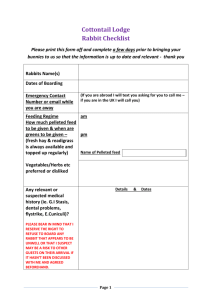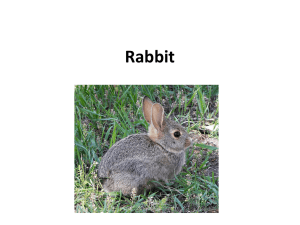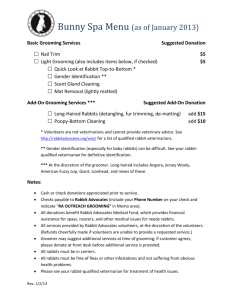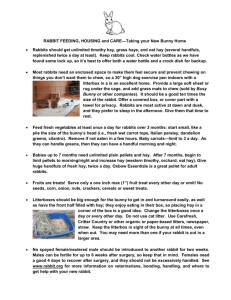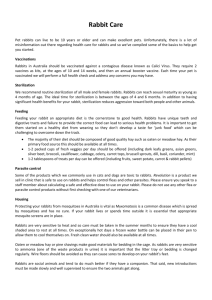Befriending Your Bunny
advertisement
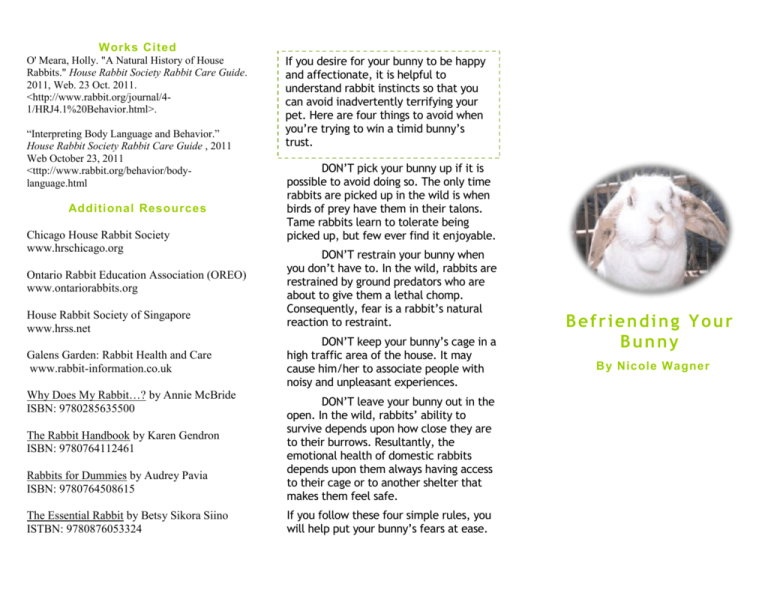
Works Cited O' Meara, Holly. "A Natural History of House Rabbits." House Rabbit Society Rabbit Care Guide. 2011, Web. 23 Oct. 2011. <http://www.rabbit.org/journal/41/HRJ4.1%20Behavior.html>. “Interpreting Body Language and Behavior.” House Rabbit Society Rabbit Care Guide , 2011 Web October 23, 2011 <tttp://www.rabbit.org/behavior/bodylanguage.html Additional Resources Chicago House Rabbit Society www.hrschicago.org Ontario Rabbit Education Association (OREO) www.ontariorabbits.org House Rabbit Society of Singapore www.hrss.net Galens Garden: Rabbit Health and Care www.rabbit-information.co.uk Why Does My Rabbit…? by Annie McBride ISBN: 9780285635500 The Rabbit Handbook by Karen Gendron ISBN: 9780764112461 Rabbits for Dummies by Audrey Pavia ISBN: 9780764508615 The Essential Rabbit by Betsy Sikora Siino ISTBN: 9780876053324 If you desire for your bunny to be happy and affectionate, it is helpful to understand rabbit instincts so that you can avoid inadvertently terrifying your pet. Here are four things to avoid when you’re trying to win a timid bunny’s trust. DON’T pick your bunny up if it is possible to avoid doing so. The only time rabbits are picked up in the wild is when birds of prey have them in their talons. Tame rabbits learn to tolerate being picked up, but few ever find it enjoyable. DON’T restrain your bunny when you don’t have to. In the wild, rabbits are restrained by ground predators who are about to give them a lethal chomp. Consequently, fear is a rabbit’s natural reaction to restraint. DON’T keep your bunny’s cage in a high traffic area of the house. It may cause him/her to associate people with noisy and unpleasant experiences. DON’T leave your bunny out in the open. In the wild, rabbits’ ability to survive depends upon how close they are to their burrows. Resultantly, the emotional health of domestic rabbits depends upon them always having access to their cage or to another shelter that makes them feel safe. If you follow these four simple rules, you will help put your bunny’s fears at ease. Befriending Your Bunny By Nicole Wagner Rabbits are social animals who love to cuddle and share life with others. In the wild, they live in colonies call warrens with hundreds of family members. This social instinct makes it possible for them to bond with humans once they are tamed. Taming The best way to tame rabbits is to entice them to voluntarily face their fear of humans. This can be done by offering them food by hand. If you periodically present your bunnies with hay, vegetables and other goodies, your bunnies will eventually get up the courage to approach you. If they like the treats they find in your hands, they will want to come back to you again and again. Before you know it, your bunnies will be doing a ‘happy dance’ whenever they see you and excitingly pressing their faces against the cage. This non-forceful method of taming lets your rabbits be in control. It breaks their fear of humans without breaking their spirits. This brings out the extroversion in their temperaments and makes them easier to befriend. Bonding Rabbits in the wild form relationships by grooming one another, and in a similar way, you can befriend your rabbits by petting them. To rabbits, petting feels like social grooming; it is a gesture of friendship and affection. As Holly O’ Meara from the House Rabbit Society instructs, “Gently stroke, comb, or kiss a rabbits’ face and you are speaking rabbit.” Rabbit Behavior In addition to ‘speaking rabbit’ it is important to understand rabbits. Here is a table for interpreting your bunnies’ behavior. Expression Licking You I’m grooming you and we’re bonding Grunting I’m angry and likely to bite! Shoving you with its nose Move over, bud. Loud tooth grinding, screaming or tooth chattering I’m in pain Or Soft tooth grinding I’m in a state of bliss. Hey! Don’t move my furniture. Chinning That’s mine. or You’re mine. Wahoooo! I’m having fun and being happy! ( “Interpreting Body Language and Behavior” ) What it means Eyes bugging out, breath quickening and heart racing I’m scared Thumping its feet Danger Alert! Something’s wrong, here! Binky (a word for when bunnies act hyper and jump straight in the air) Note: If your rabbit is frequently exhibiting negative emotions, then you might want to read the back of this brochure.
